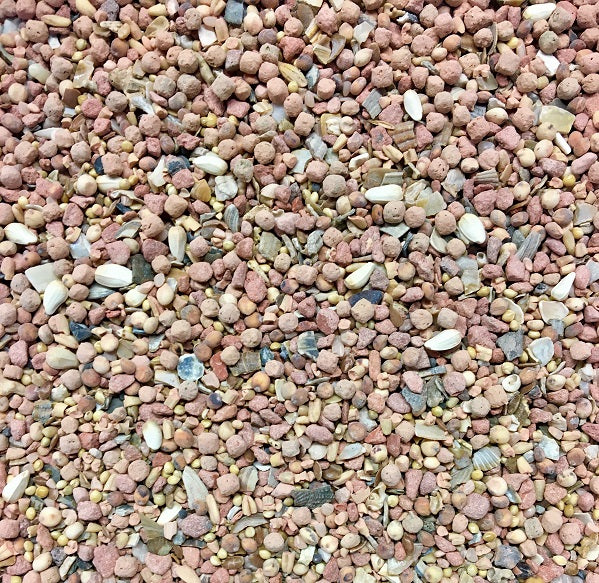Two Schools of Thought
The use of and purpose of grit in a bird’s diet is a debated topic. Some fanciers believe that grit should not be given at all or only given occasionally in limited amounts. It is thought that birds may overeat grit and that their bodies are capable of functioning without supplemental grit. We here at JEDDS are firm believers that grit should be available year-round.
Because birds do not have teeth to chew their food, birds collect little bits of gravel which collect in a special muscular organ called the gizzard. The gizzard contains hard keratinized plates, and while the keratinized plates are capable of grinding seeds on their own, the addition of gravel/grit increases its ability to more thoroughly crush and grind food into an easier to digest form. Vitamins and minerals are thus made more available and readily absorbed with less energy required. Birds not given grit will often have watery droppings, be underweight and lethargic.
Although bird feed mixes often contain several different seeds which may make up a balanced diet, birds tend to pick through the seed mix for their favorites. As a result, birds may be vitamin and mineral deficient when given a seed diet only. Grit is less necessary if birds are given pelletized food as each pellet is fortified with vitamins and minerals and nutritionally balanced.
Significance of Calcium
Naturally occurring calcium such as in limestone or gypsum, as well as direct sources of calcium such as pieces of egg shell, snail shell, bone fragments, and/or seashells are ingested and utilized for their vitamin and mineral properties. Grit inside the gizzard naturally wears down and releases minerals into the bloodstream over time.
Vitamin D3, Phosphorus and Calcium are critical for growing and adult birds. Birds obtain vitamin D3 through two different routes: by ingestion of it in feed/grit or by exposure to sunlight. Calcium supplements should include phosphorus and Vitamin D3 as they increase the absorption of Calcium in the body.
Hens require extra calcium for bones and egg production. A captive hen not provided with supplemental calcium will utilize calcium from her bone, which over time will cause osteoporosis (softening/weakening of bone). Egg shells may begin to soften and the hen risks becoming egg bound (a soft-shelled egg is stuck inside the hen’s oviduct).
Growing chicks also have a high calcium demand as their bones are growing rapidly. In severe or prolonged cases of vitamin D/Calcium/Phosphorus deficiency, chicks are unable to walk and may die of suffocation as their bones cannot support the muscle movements required for breathing. In marginal cases, the chicks have a stiff gait, decreased growth and eventual bone deformities, especially in the legs (this is referred to as Rickets).
Symptoms of hypocalcaemia
- Lameness
- Hock swelling
- Soft bones and beak
- Birds go off legs
- Poor growth
- Birds rest squatting
- Reduction in bodyweight
Grit Additives
Quality grit is a blend of many ingredients rather than just a single stone. Additives which may be found in grit mixes are kelp, anise seed oil, flowers of sulfur, small seeds, salts, and/or charcoal. Kelp is a natural source of vitamins A, B1, B2, C, D and E, as well as minerals including zinc, iodine, magnesium, iron, potassium, copper and calcium. In fact it contains the highest natural concentration of calcium of any food. Vitamins and minerals are deposited in the egg yolk by the hen during egg formation. Developing embryos deficient in iodine often fail to hatch out, and kelp is a natural remedy for this issue.
A small amount of Anise Seed Oil is sometimes added either by the grit manufacturer or more commonly, by the fancier. Anise seed oil is a sweet smelling essential oil that pigeons are attracted to, and is thought to increase a bird’s willingness to return and drop into the loft, as well as helping to resettle birds, relieving pain and stress and stimulating the circulatory systems.
For more info about Anise, see our previous article; https://www.jedds.com/the-benefits-of-anise-oil/
While a pigeon picks thru the grit, flowers of sulfur (a very fine sulfur powder which can be added to the grit), lightly dusts the birds face and helps to deter mosquito and other insect bites, thereby reducing Pox virus outbreaks in the loft.
Powdered minerals and flowers of sulfur often stick to smalls seeds (such as Pigeon Candy) which can be added in small quantities. These seeds also increase the birds interest to the grit.
Charcoal (which has a detoxifying affect) and salts can be made available in the grit in small quantities. Salts are especially needed later in the season after breeders have produced a few rounds to renew their normal salt balance.
When to Use
Grit should be made available to birds throughout the year, especially before and during the breeding season. Grit allows birds free access to any vitamins and minerals they feel they are lacking, and aids in more thorough energy efficient digestion and utilization of vitamins and minerals available in seed.
Grit should be removed from the loft when treating with medicines in the ‘cycline’ family, such as tetracycline, doxycycline etc. Calcium, magnesium and zinc may bind with these medicines, and interfere with the medicine’s absorption in the body (up to 90%), making them significantly less effective.



